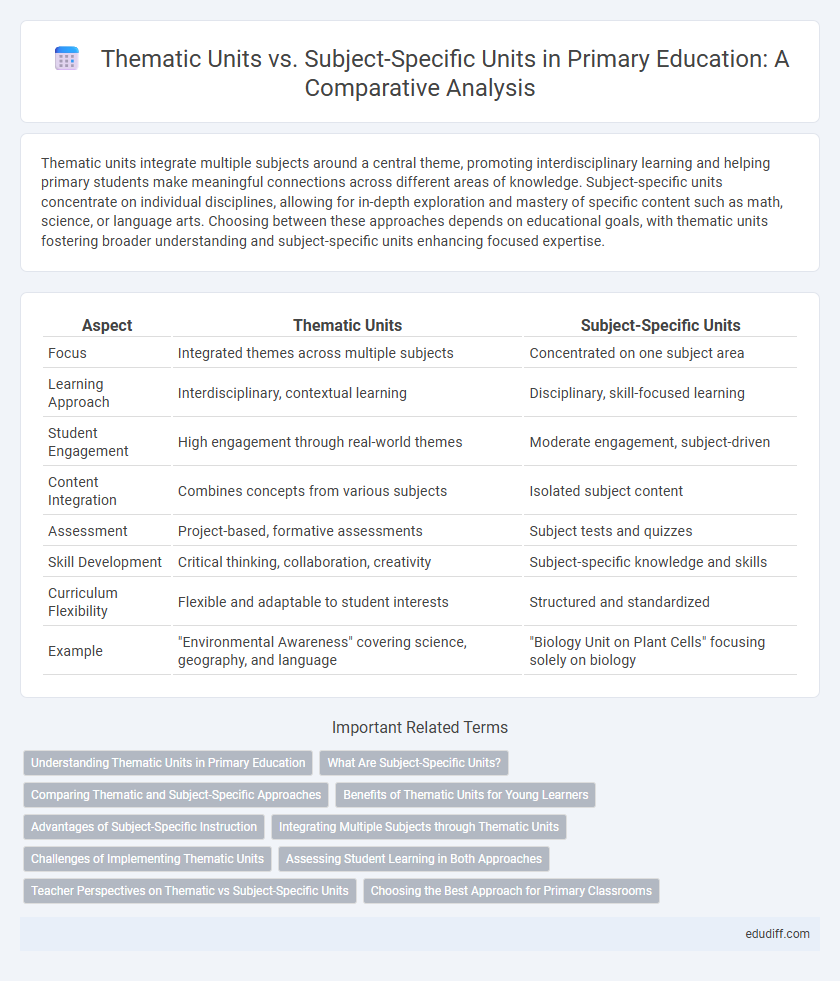Thematic units integrate multiple subjects around a central theme, promoting interdisciplinary learning and helping primary students make meaningful connections across different areas of knowledge. Subject-specific units concentrate on individual disciplines, allowing for in-depth exploration and mastery of specific content such as math, science, or language arts. Choosing between these approaches depends on educational goals, with thematic units fostering broader understanding and subject-specific units enhancing focused expertise.
Table of Comparison
| Aspect | Thematic Units | Subject-Specific Units |
|---|---|---|
| Focus | Integrated themes across multiple subjects | Concentrated on one subject area |
| Learning Approach | Interdisciplinary, contextual learning | Disciplinary, skill-focused learning |
| Student Engagement | High engagement through real-world themes | Moderate engagement, subject-driven |
| Content Integration | Combines concepts from various subjects | Isolated subject content |
| Assessment | Project-based, formative assessments | Subject tests and quizzes |
| Skill Development | Critical thinking, collaboration, creativity | Subject-specific knowledge and skills |
| Curriculum Flexibility | Flexible and adaptable to student interests | Structured and standardized |
| Example | "Environmental Awareness" covering science, geography, and language | "Biology Unit on Plant Cells" focusing solely on biology |
Understanding Thematic Units in Primary Education
Thematic units in primary education center around integrating multiple subject areas within a unified theme, enhancing students' critical thinking and real-world connections. These units promote interdisciplinary learning by linking language arts, science, social studies, and mathematics around common concepts, fostering deeper comprehension and engagement. Understanding thematic units helps educators design cohesive, meaningful lessons that support holistic development and varied learning styles in young learners.
What Are Subject-Specific Units?
Subject-specific units concentrate on individual disciplines, such as math, science, or language arts, allowing for focused skill development and deep content mastery within each subject. These units follow a structured curriculum tailored to the unique concepts, terminology, and methodologies of the specific field, ensuring comprehensive understanding. Emphasizing subject-specific units supports standardized assessment and progress monitoring in core academic areas.
Comparing Thematic and Subject-Specific Approaches
Thematic units integrate multiple subjects around a central theme to promote holistic understanding and real-world connections, enhancing student engagement and critical thinking. Subject-specific units concentrate on distinct disciplines, allowing deep exploration of content knowledge and skills within a defined curriculum framework. Comparing both approaches reveals that thematic units foster interdisciplinary learning and creativity, while subject-specific units support mastery of individual subjects and standardized assessment readiness.
Benefits of Thematic Units for Young Learners
Thematic units integrate multiple subject areas around a central theme, fostering deeper engagement and making learning more meaningful for young learners. This approach promotes cognitive connections, enhances vocabulary retention, and supports holistic development by linking real-world concepts across disciplines. Thematic units also encourage creativity, critical thinking, and collaboration, which are essential skills for early education success.
Advantages of Subject-Specific Instruction
Subject-specific instruction enhances in-depth understanding by allowing students to focus on specialized content and develop expertise within each discipline. It promotes improved academic performance through targeted teaching methods and assessment aligned with subject standards. This approach facilitates clearer curriculum organization, enabling efficient resource allocation and teacher specialization for optimal learning outcomes.
Integrating Multiple Subjects through Thematic Units
Thematic units integrate multiple subjects by focusing on a central theme, fostering interdisciplinary learning and enhancing critical thinking skills in primary education. This approach connects language arts, science, social studies, and mathematics, enabling students to explore concepts deeply and make real-world connections. Research shows thematic units increase student engagement and retention by providing cohesive, meaningful learning experiences across diverse content areas.
Challenges of Implementing Thematic Units
Implementing thematic units in primary education often faces challenges such as aligning curriculum standards across multiple subjects and ensuring teacher expertise in diverse content areas. Limited instructional time and resources can hinder the integration of thematic units, affecting depth and quality of learning experiences. Addressing these challenges requires collaborative planning and professional development to effectively connect interdisciplinary concepts within thematic frameworks.
Assessing Student Learning in Both Approaches
Assessing student learning in thematic units emphasizes interdisciplinary knowledge integration and real-world application, allowing evaluation of critical thinking and problem-solving skills across subjects. Subject-specific units focus on mastery of discrete content areas, using standardized assessments to measure understanding in core disciplines like math, science, and language arts. Combining both approaches provides a comprehensive view of student progress, balancing holistic competencies with targeted academic achievement.
Teacher Perspectives on Thematic vs Subject-Specific Units
Teachers often perceive thematic units as more engaging for primary students because they integrate multiple subjects around a central theme, fostering deeper understanding and real-world connections. In contrast, subject-specific units allow for focused content delivery and mastery of individual disciplines, which some educators find essential for building foundational knowledge. The preference between thematic and subject-specific units varies depending on teaching goals, student needs, and curriculum standards within primary education.
Choosing the Best Approach for Primary Classrooms
Selecting the optimal approach for primary classrooms depends on curriculum goals and student needs, with thematic units fostering interdisciplinary connections and enhancing critical thinking skills. Subject-specific units allow for deep mastery of individual disciplines, supporting foundational knowledge in literacy, math, and science. Balancing thematic and subject-specific units can maximize engagement and academic achievement in early education settings.
Thematic Units vs Subject-Specific Units Infographic

 edudiff.com
edudiff.com